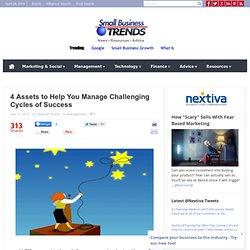

What The Greatest Self-Help Books Of The Last Decades Can Teach You In 7 Minutes. 4 Assets to Help You Manage Challenging Cycles of Success. “When you get to the end of your rope, you tie a knot and hang on” ~Franklin Delano Roosevelt When I think about how people describe me, more often than not, the words “dedicated and perseverance” top the list.

For the Weary Leader. You are tired.

You are frustrated. You are weary. Weary of feeling as though your dreams are impossible to reach. Weary of being told you don’t fit in, won’t make the cut or don’t have what it takes to play on the team. Weary of feeling as though no one appreciates the unique gifts, talents and skills you so desperately want to share with the world around you. Any of this sound familiar? 8 Common Mistakes in How Our Brains Think and How to Prevent Them.
12.3K Flares Filament.io 12.3K Flares × Get ready to have your mind blown.

I was seriously shocked at some of these mistakes in thinking that I subconsciously make all the time. Obviously, none of them are huge, life-threatening mistakes, but they are really surprising and avoiding them could help us to make more rational, sensible decisions. Especially as we thrive for continues self-improvement at Buffer, if we look at our values, being aware of the mistakes we naturally have in our thinking can make a big difference in avoiding them.
Unfortunately, most of these occur subconsciously, so it will also take time and effort to avoid them—if you even want to. Regardless, I think it’s fascinating to learn more about how we think and make decisions every day, so let’s take a look at some of these thinking habits we didn’t know we had. How to Immediately Improve Your Life (Hint: It Starts With Improving the Lives of Others) Last week a few HuffPost editors and I were treated to a visit by Bill Drayton and Mary Gordon.

Bill Drayton is the founder of Ashoka and a longtime champion of social entrepreneurship, a term that he coined and that has now spread across the world. Mary Gordon is a former kindergarten teacher who founded Roots of Empathy, an organization dedicated to teaching emotional literacy and promoting empathy in children. She was also one of the first Ashoka fellows. Our visit started with talk of the newborn recently welcomed by one of our editors, Gregory Beyer, whereupon Mary presented him with a onesie with "Empathy Teacher" emblazoned on the front. But as Mary -- a great empathy teacher herself -- told us, it's a two-way street, and empathy is best nurtured by example.
9 Ways to Reach Your Fullest Potential Every Day. Why does it seem like time goes by so quickly?

We start a week and before we know it, it’s already the weekend. 10 Ways to Gain Fame for Being a Good Person. Email.

Dale Carnegie's Top 10 Tips for Improving Your Social Skills. Image by kalandrakas.

“The ideas I stand for are not mine. The Art of the Imperfect Pitch. In these volatile times, it’s clear that innovation has become an imperative. Organizations that become too entrenched with being good at what they do are simply putting themselves in a vulnerable market position. Middle managers with great ideas can sometimes be caught between a rock and a hard place. Managing “from the bottom up” is always a challenge, and that’s particularly so when it comes to bringing something new to the table. In observing managerial dynamics as a researcher and consultant, I’ve extracted two vital pieces of advice for anyone trying to promote innovation to higher ups. Racing With The Machines.
Don't Multitask: Your Brain Will Thank You. The ability to juggle work is a standard job requirement.

Researchers have another name for this supposedly desirable skill, however: chronic multitasking. If this sounds more like an affliction than a resumé booster, that's because research has shown again and again that the human mind isn't meant to multitask. Even worse, research shows that multitasking can have long-term harmful effects on brain function.
In a 2009 study, Stanford researcher Clifford Nass challenged 262 college students to complete experiments that involved switching among tasks, filtering irrelevant information, and using working memory. Nass and his colleagues expected that frequent multitaskers would outperform nonmultitaskers on at least some of these activities. They found the opposite: Chronic multitaskers were abysmal at all three tasks. Multitasking is a weakness, not a strength. This suggests a two-task limit on what the human brain can handle. Top 10 Hacks for Automating Your Life. Get into Action: 77 Thoughts on Motivation. The Secret To Happiness Is Control. Humanism. Try These Cognitive Restructuring Exercises to Improve Your Mood and Reduce Stress. Why Your Vision Must Be Grounded in Reality. 10 Instant Emotional Fitness Tools.
When things get out of control and you momentarily lose your emotional balance, there are any number of little things you can do to regain it. Here are ten tools to help get you started. 1. 33 Ways To Stay Creative. The Political Compass. 18 Rules of Living by the Dalai Lama.